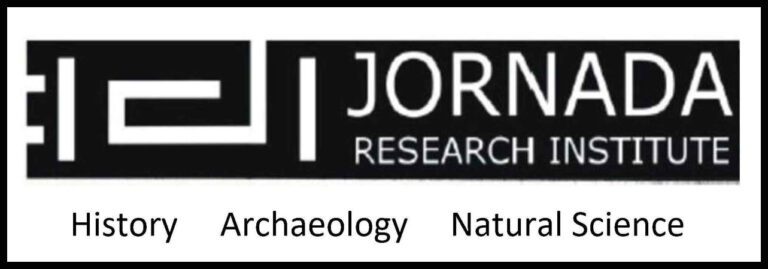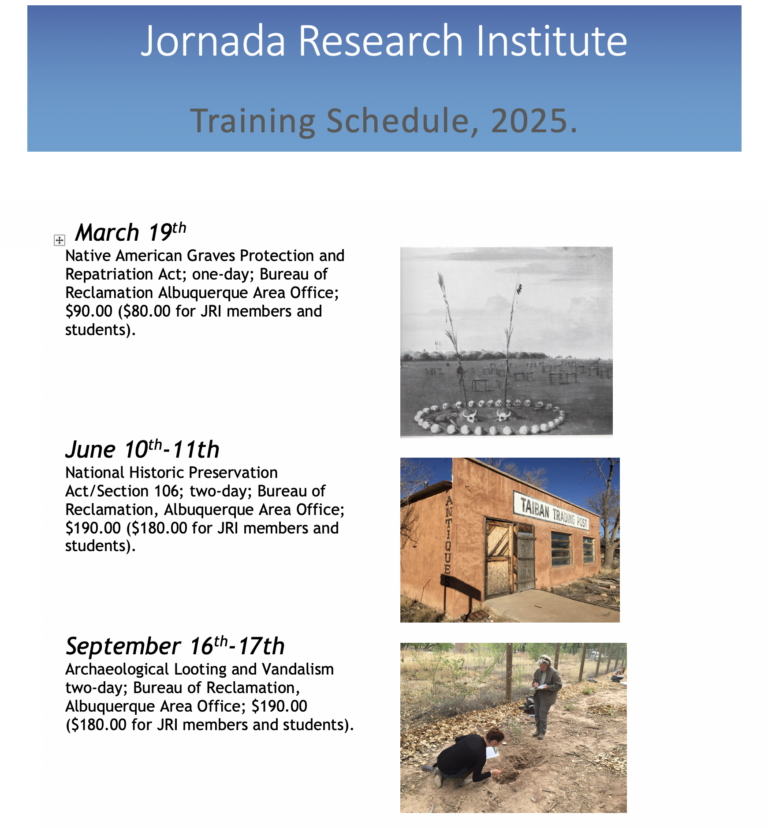Please email Jeffery Hanson for more information or to sign up – thank you!
One Day Training Course in Conducting Archaeological Condition Assessments
At Petroglyph National Monument
Purpose
The purpose of this one-day (8 hour) training class will be to instruct attendees on the importance of conducting detailed and comparable site condition assessments for data management and treatment purposes, and to provide them with methodological tools to achieve those goals. The course will consist of two parts: part one will consist of a morning class session of the presentation of condition assessment concepts, methods and examples for archaeological sites and petroglyph sites; part two will consist of an afternoon field application of the condition assessment methodology a group of petroglyph panels. In order for archaeologists and site managers (be they federal, state, local or private) to make the most informed recommendations, they require field data that addresses site significance, site integrity and site conditions. These three components are intertwined in that they inform management decisions about site treatment. Ideally, managing sites (and their preservation/protection, National register eligibility, and research potential) should be a cyclical process of recording, assessing conditions, site evaluation, site treatment and re-evaluation over time. While synchronic site evaluations are useful, they can quicky become outdated in the face of the dynamic quality of archaeological site formation and petroglyph “life history.” Minimally, one should have good baseline site data from which longitudinal re-evaluations can be set into the site records.
$90.00 for regular attendees, $80.00 for JRI members and students. Date of course TBA.
Please view and/or download the full course outline and more information HERE.
One Day Training Course on the Native American Graves Protection and Repatriation Act
It has been over 30 years since Congress passed the Native American Graves Protection and Repatriation Act (NAGPRA), which included a set of provisions that continues to reverberate through Archaeology, physical anthropology, museology, cultural resources management, tribal communities, and the government-to-government relationship between Native American tribes and the United States Government. Passed on the heels of the National Museum of the American Indian Act of 1989 (NMAIA), both NAGPRA and NMAIA laid out the groundwork and processes for the identification and repatriation of thousands of Native American human remains, funerary objects and items of cultural patrimony. These acts were meant to redress the longstanding inequity in the treatment of Native American burials that began in the mid-19th century well into the 1970s and 1980s, and tribal objections to the housing of their ancestors in museums. Stakeholders from all sides weighed in, from the scientific community to tribal governments. The NAGPRA process, though carried out successfully over the years, has resulted in much controversy over issues such as “right of possession,” “exceptional scientific value,” “academic freedom,” and more broadly, who owns culture.
This one-day training class will provide attendees with an understanding of the historical factors that led to the passage of NAGPRA, the provisions and stipulations involved in the NAGPRA process, and cases studies in human remains excavations and analysis, inadvertent discovery, consultation and criminal activity. This course will count as an hour-per-hour credit for those seeking HPD continuing education credit for permit renewals in New Mexico. The fee is $90.00 per attendee, $80.00 for students. Date of course TBA.
Please view and/or download the full course outline and more information HERE.
Training on Looting, Vandalism and the Archaeological Resources Protection Act
Rationale
Looting is still a very serious and frequently occurring activity throughout the United States. In 2004, the National Park Service reported that the theft of protected artifacts and natural resources such as fossils had jumped 46 percent from the previous two years to about 20,000 violations. In 2006, federal law enforcement finally caught up with looters that were hooked on methamphetamines, but not before they had ravaged more than 100 cultural sites in Oregon and racked up more than one million dollars in archaeological damage (The Oregonian, November 1, 2006). Networks of collectors interlock from one region of the country to another. In Utah’s San Juan County alone, there are an estimated 20,000 known archaeological sites, and more than ninety percent have been looted (San Francisco Chronicle, April 8th, 2001). In addition to the more traditional commercial looter, a new breed of methamphetamine addicts is infusing a newer and more dangerous risk to the archaeological record. On U.S. Bureau of Reclamation lands along Caballo Reservoir in New Mexico, for example, thirty percent of the 117 recorded sites showed signs of looting (Archaeological Sites Inventory, U.S. Bureau Reclamation, Albuquerque Area Office).
There are very few organizations or institutions that offer workshops or mini-courses for archaeologists and other cultural resources professionals on looting and vandalism. This workshop will be of value to numerous stakeholders; federal agencies responsible for protecting cultural resources; archaeologists who can benefit from understanding the damage assessment process; avocationals and site stewards, who are often the boots-on-the-ground site monitors; Native American groups, on whose lands looting often occurs; and law enforcement officers who can benefit from understanding the interplay between crime investigation and the archaeological specialists who assist them. While one may not be called upon to assist federal law enforcement, looting occurs not only on federal and tribal lands, but also state and private lands. In addition, the techniques learned will allow for recording site damage, tracking single or multiple episodes of looting, and writing field assessment reports that can aid land managers or private landowners by making site protection (for example, periodic monitoring and stabilization of site damage) recommendations. Those who take this workshop will also work through the ethical and values implications of looting and those who do it, and the larger issue of ethical values and responsibilities toward the archaeological record.
$190.00 for regular attendees, $180.00 for JRI members and students. Date of course TBA.
Please view and/or download the full course outline and more information HERE.
Training on the National Historic Preservation Act/Section 106
Introduction
Those of us who have honed our skills working with historic preservation laws by the seat of our pants through trial and error know how complex and confusing these laws can be to those unfamiliar with them. This is especially true with the National Historic Preservation Act (NHPA) We respond to Section 106 actions to assess potential impacts on historic properties, design and implement Section 110-driven projects, make eligibility determinations, and write agreements documents, often on a project-to project basis. In conjunction with these activities we consult with the appropriate federal and state agencies, federally recognized Native American tribes and other stakeholders (such as irrigation and conservation districts). It is important that cultural resources practitioners be grounded in historic preservation laws, and learn the various approaches to implementation of the National Historic Preservation Act. JRI’s two-day training course on NHPA is designed to provide a foundation for CRM professionals and the general public to learn, understand and implement the Section 106 process and other requirements of NHPA. The course is designed for anyone who, at some time or another, will have to be part of the compliance and review process for projects covered under the NHPA There are many misconceptions about what NHPA covers and how it relates to other laws such as the National Environmental Policy Act (NEPA) and the Native American Graves Protection and Repatriation Act (NAGPRA).
$190.00 for regular attendees, $180.00 for JRI members and students. Date of course TBA.
Please view and/or download the full course outline and more information HERE.
Below are some of our recent training opportunities.
For more information, Contact: Jeffery Hanson at jefferyhanson64@gmail.com; 817-658-5544
9The Jornada Research Institute is pleased to advertise 5 training workshops for cultural resource management professionals. All training classes have been approved by theNMSHPO for continuing education credits (CEC) for permitting purposes
1) Looting and vandalism of archaeological sites and the Archaeological Resources Protection Act. This two day workshop will consist of classroom and field components.
Cost: $190.00 per attendee; $180.00 for JRI members; $180.00 for students.
Location: Unless otherwise specified, training will be held in Albuquerque, NM.
Topics to be covered include:
- The nature and extent of looting and vandalism in the United States.
- How to identify and record site damage.
- Overview of the Archaeological Resources Protection Act and related legislation.
- Discussion of specific cases and moral and ethical considerations.
- A field exercise in site damage recordation
Contact: jefferyhanson64@gmail.com
2) The Historic Preservation Act (including Sections 106 and 110). This is a two-day workshop.
It will be useful to CRM professionals employed by tribal governments, state and federal agencies, archaeologists in the private sector, site-stewards, and interested public. This two day workshop will consist of classroom presentations, discussions, and exercises.
Cost: $190.00 per attendee; $180.00 for JRI members; $180.00 for students.
Location: Unless otherwise specified, training will be held in Albuquerque, NM.
Topics to be covered include:
- Historical context of antiquities legislation leading to the National Historic Preservation Act.
- Overview of NHPA and its major provisions
- Working with Sections 110 and 106
- National Register eligibility
- Data recovery plans
- Traditional cultural properties
Contact: jefferyhanson64@gmail.com
3) Condition Assessment for Archaeologists.The purpose of this one-day workshop will be to instruct attendees on the importance of conducting detailed and comparable site condition assessments for data management and treatment purposes, and to provide them with a methodological tool to achieve those goals. The course will consist of two parts: part one will consist of a morning in-class session of the presentation of condition assessment concepts, methods and examples; part two will consist of a field application of the condition assessment methodology on an archaeological site. The class session will cover identifying and measuring various risk factors with examples provided. The field session will employ a condition assessment recording tool to measure and identify risk and risk ranking.
Cost: $90.00 per attendee; $80.00 for JRI members; $80.00 for students.
Location: Unless otherwise specified, training will be held in Albuquerque, NM.
Contact: jefferyhanson64@gmail.com
4) Native American Graves Protection and Repatriation Act. This one-day training class will provide attendees with an understanding of the historical factors that led to the passage of NAGPRA, the provisions and stipulations involved in the NAGPRA process, and cases studies in human remains excavations and analysis, inadvertent discovery, consultation and criminal activity.
Cost: $90.00 per attendee; $80.00 for JRI members; $80.00 for students.
Location: Unless otherwise specified, training will be held in Albuquerque, NM.
Contact: jefferyhanson64@gmail.com
5) Training in the use of unmanned aircraft systems. Jornada Research Institute.
(JRI) and Emery Riddle Aeronautical University (ERAU) are excited to offer training in the use of Unmanned Aircraft Systems (UAS) (the use of Drones for collecting data) remote sensing. This training will be a two-day class.
Cost: $85.00/day
Location: Alamogordo/Tularosa
Contact: dgreenwald@tularosa.net
These courses will count as an hour-per-hour credit for those seeking HPD continuing education credit for permit renewals in New Mexico.
We plan to offer these workshops annually, either in the spring or fall, depending on level of interest.
Cost per attendee = Cost will vary based on location of training. (JRI members receive 10% discount)
NOTE: If you are an agency or institution that conducts business electronically for which we are providing a service, you must go through the “donate” process. To do this click the “Donate” button on the Home page and fill out the form. We will send you a purchase order or an invoice to verify that your payment is for services rendered.
To request more information, please write to:
JORNADA RESEARCH INSTITUTE
P.O. BOX 684
TULAROSA, NM 88352
Via email:dgreenwald@tularosa.net



